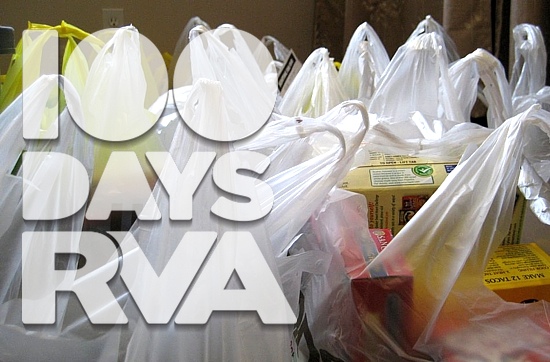Day #069: A future without plastic bags
Plastic bags are bad for the environment, bad for wallets, and bad for Richmond.

Inspired by Michael Bierut’s 100 Day Project, 100 Days to a Better RVA strives to introduce and investigate unique ideas to improving the city of Richmond. View the entire project here and the intro here.
- Idea: A plastic bag ban and zero packaging stores.
- Difficulty: 3 — Many cities already have bans including Los Angeles, San Francisco, Chicago, Austin, and Seattle and many states have pending legislation including Massachusetts, New Jersey, Rhode Island, and Puerto Rico.
Governor Jerry Brown of California signed America’s first statewide ban on single-use plastic bags at grocery and convenience stores on Tuesday. The ban, which will take effect in July 2015 allows plastic bags for produce, use at other retailers, and allows grocers to charge a fee of at least $0.10 for the use of paper bags. Richmond should investigate the impact of a bag ban while businesses look for ways to cut costs and distinguish themselves by reducing and eliminating packaging.
The average person uses 326 plastic bags per year and creates more than three pounds of household trash per day. Most of this waste ends up in Virginia landfills. Some is recycled, some ends up as litter, and some ends up in the Great Pacific Ocean Trash Vortex.1
For those less concerned with protecting the environment, the bags are made from crude oil and natural gas. Easing oil demand, even marginally, would conserve key inputs to manufacturing for more important products. More importantly, bags increase the cost of shopping.
Lawmakers of both parties who opposed SB270 said it would penalize lower-income residents by charging them for bags they once received for free.Yahoo News
The truth is plastic bags are not free. They have a cost that is included in the price of every product in the grocery store,2 but convention and predictability has made them a mainstay in American supermarkets. In fact, all packaging and shipping costs make up a portion of the sticker prices of every item in grocery stores. Some stores have been quick to realize this.
Economies of scale in transportation is a major reason why Walmart is taking over the world with its unbeatable prices. It’s the same reason they are obsessing over reducing packaging–even if they say it’s for saving the environment.
Limiting packaging offers a way to cut costs while differentiating a company from competitors. Eliminating packaging, well that’s next level, and it’s exactly what Sara Wolf and Milena Glimbovski are doing at Original Unvertpackt in Berlin.
The small grocery store doesn’t sell any products that come in boxes, bags, jars, or containers, and they don’t use shelves. Instead products come in bulks bins and vertical storage containers that can be used to fill up containers brought from home.3
It took the two entrepreneurs just three weeks to crowd fund $137,000; an amount well above their $57,000 goal. Berlin makes trendy cities like Porltand and Austin look tame, but there is clearly a demand for this type of store.
While American grocery stores are unlikely to rid branded products like Cheerios and Chips Ahoy from shelves, it would be great to aggressively add products in the vein of Original Unvertpackt. Kroger on Cary Street added a section that sells grains, nuts, and dried fruit by weight, but it is rarely restocked and it uses plastic containers. A simple calibration button would allow packaging to be brought from home.
Plastic bags in Richmond will go the way of the buffalo. We can either redefine ourselves today with progressive stores and policies that will put Richmond on the forefront, or we can drag our heels and waste away until the bitter, political end. One of these two options is undoubtedly preferable.
Love this idea? Think it’s terrible? Have one that’s ten times better? Head over to the 100 Days to a Better RVA Facebook page and join in the conversation.
Photo by: MTSOfan
- The heap is invisible from aircraft and estimates of its size range from Texas to twice the size of the Continental United States. ↩
- Kroger offer $0.05 per reusable bag. This bag subsidy is paid for by other customers, and while I’m for sustainable incentives, a better alternative would be eliminating bags so no costs are passed on to any customers. ↩
- This is why I’m so excited for Growlers to Go. Beer packaging creates a serious amount of waste. ↩
-
Recommend this
on Facebook -

Report an error
-

Subscribe to our
Weekly Digest





Notice: Comments that are not conducive to an interesting and thoughtful conversation may be removed at the editor’s discretion.
Ok I’m all for lowering the amount of plastic bags we use. However, I would rather reuse them or recycle them. You get rid of my plastic bags and what do I scoop my cats used cat litter into to dispose of it???
This raises some really complicated questions. Reuse and “recycling” are great, but they aren’t going to make a meaningful difference without reduction. I don’t believe a reduction will happen unless we fundamentally change our habits and expectations. It’s easy to talk about sustainability, but I don’t believe widespread sustainability happens if people have to think about sustainability to be sustainable.
The fundamental problem is the wastefulness of making more (even if they are recycled) bags because we are incapable of remembering canvas bags or designing systems that are less wasteful – to me, this is really a transportation issue.
Personally, I’m no longer interested in subsidizing wasteful plastic bags through my grocery purchases so people can use them as trash bags or poop bags when permanent options are available.
@Kacie – Get a trashcan with a lid. Keep it by the litterbox.